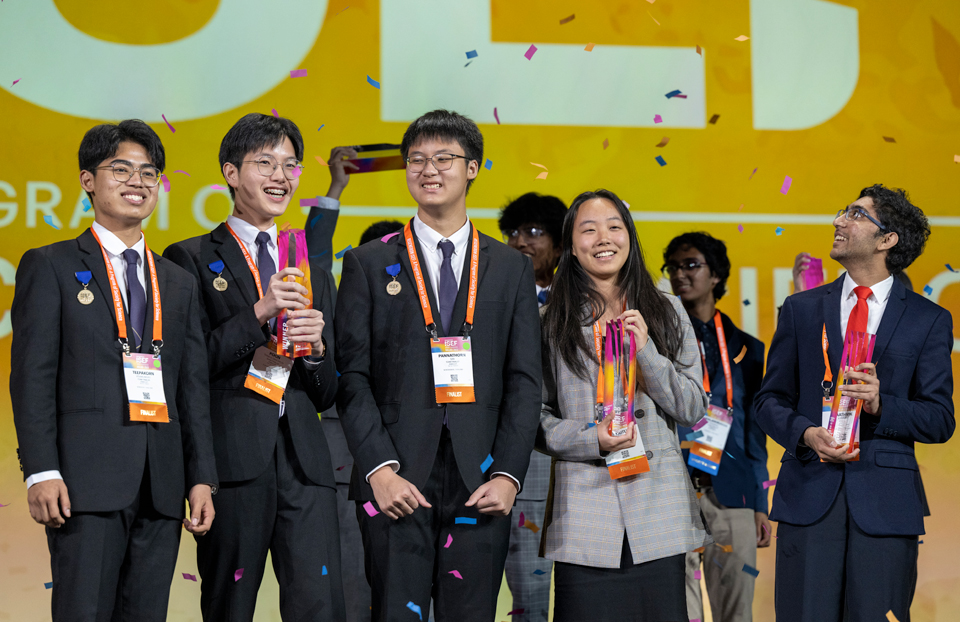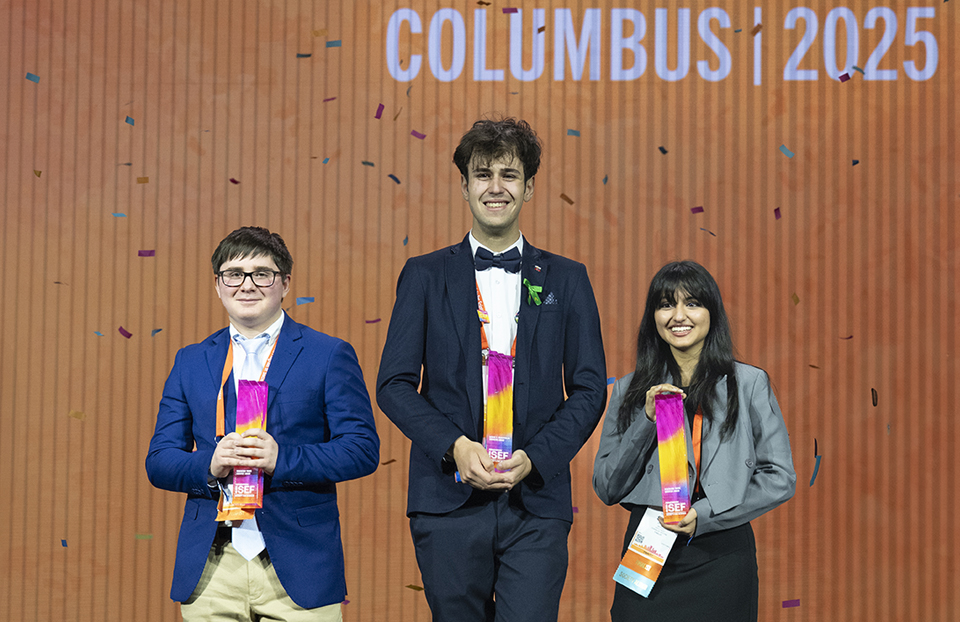High school scientists and engineers win nearly $9 million at the Regeneron International Science and Engineering Fair 2023

Regeneron Pharmaceuticals, Inc. and Society for Science (the Society) announced that Kaitlyn Wang, 17, of San José, CA, won the $75,000 top award in the 2023 Regeneron International Science and Engineering Fair (Regeneron ISEF), the world’s largest global pre-college science and engineering competition, for a project that explored planets that orbit very close around their suns. Other top prizes went to projects in the fields of computational biology, animal sciences and neurobiology.
The top winners were honored during two award ceremonies, the first of which took place on the evening of May 18 and featured Special Award winners. The Grand Awards Ceremony was held on the morning of May 19 and included the announcement of the top prize of $75,000. In total, nearly U.S. $9 million was awarded to the finalists, who were evaluated based on their projects’ creativity, innovation and depth of scientific inquiry. The competition featured over 1,600 young scientists representing 49 states and 64 countries across the world.
Kaitlyn Wang won first place and received the $75,000 George D. Yancopoulos Innovator Award, named in honor of the pioneering drug researcher and Regeneron co-founder, President and Chief Scientific Officer, for finding an efficient way to identify certain exoplanets that orbit very closely around their stars. Previous techniques used to detect these ultra-short-period planets required enormous computational power but were not as effective at identifying these planets. Kaitlyn surmounted that problem by creating a special algorithm that runs on cheap hardware and results in much faster and higher-precision findings. Using her research, she says she found the smallest of these planets ever discovered.
Saathvik Kannan, 17, of Columbia, Missouri, received one of two Regeneron Young Scientist Awards of $50,000 for using biocomputational methods to understand the causes of heightened infectivity in the disease mpox after it reemerged in 2022. Saathvik’s approach, named Bioplex, uses a combination of machine learning and three-dimensional comparative protein modeling to decode structures like those that enable the mpox virus to replicate. This allowed him to identify the mutations in the virus that likely made it more infectious as well as other mutations that could make it resistant to antibiotics. Saathvik believes scientists will also be able to apply Bioplex to future outbreaks of other viruses.
Teepakorn Keawumdee, 17; Pannathorn Siri, 16;and, Poon Trakultangmun, 18,of Bangkok, Thailand,received the second Regeneron Young Scientist Award of $50,000 for developing an innovative incubation chamber that promotes the survival of the green lacewing insect, a natural predator of the mealybug, a harmful pest. In nature, the green lacewing has a low survival rate, but the team’s new system increased the lacewing’s survival rate five-fold. In field tests, their incubation system was an effective alternative to insecticides and lowered the mealybug population density nearly four-fold.
“Congratulations to the Regeneron International Science and Engineering Fair 2023 winners,” said Maya Ajmera, President and CEO, Society for Science and Executive Publisher, Science News. “I am humbled by the creativity and determination demonstrated by these exceptional students and proud of all they have accomplished with their outstanding research abilities. Together, these students from various academic disciplines and geographies are solving the world’s most intractable problems.”
Regeneron ISEF provides a global stage for the best and brightest young scientists and engineers around the world. Through this competition Regeneron and the Society support and invest in the next generation of leading STEM innovators who are generating ideas and acting as catalysts for the change needed to improve the well-being of all people, society and the planet.
“We are thrilled to celebrate this year’s Regeneron ISEF finalists as they join our growing community of bold individuals tackling the world’s most pressing challenges,” said George D. Yancopoulos, M.D., Ph.D., co-founder, President and Chief Scientific Officer of Regeneron. “I applaud today’s finalists and all the ISEF participants for their relentless pursuit of groundbreaking ideas that ignite positive and sustainable change in our world. I owe so much of my passion for science to the experiences and mentors I had in high school, and I hope that today is just the beginning of a lifelong commitment to STEM for many of these students.”
Other top honors from the competition include:
Natasha Kulviwat, 16, of Jericho, New York, received the Gordon E. Moore Award of $50,000 for Positive Outcomes for Future Generations for her search for biomarkers to help prevent suicides. By analyzing de-identified brain tissue from 20 people, Natasha measured levels of two proteins, cytokine and claudin-5, and found that neuroinflammation and claudin-5 were increased in the brains of suicide cases. Her work suggests that high levels of the protein claudin-5 could serve as pre-markers for suicide and that certain anti-inflammatory drugs might decrease claudin-5 levels.
Yuyang Wang, 16, of Shanghai, China,received the Craig R. Barrett Award for Innovation of $10,000 for his development of an inchworm-style stick-climbing robot. This type of robot conventionally has grabbers that allow it to climb over and under obstructions like a caterpillar does, but he added skateboard-like wheels, which allow it to perform better than existing inchworm-style robots when the angle is less than 22°. The hybrid wheel/grabber assembly is novel, and he believes his robot will work well for tasks that are potentially dangerous to humans, such as inspecting damaged high-voltage lines.
Rishabh Ranjan, 17, and Gopalaniruddh Tadinada, 17, of Louisville, Kentucky,received the H. Robert Horvitz Prize for Fundamental Research of $10,000 for building a custom, automated system to detect gastrointestinal cancer before serious symptoms appear. The team’s system combines robotics and machine learning to analyze blood samples to identify healthy patients, as well as those with pancreatic, colorectal or hepatic cancers, in only three hours at an estimated cost of only $300. Detecting these cancers before they metastasize could make treatment much simpler and more effective.
Eugene Chen, 16, of Shanghai, China, received the Peggy Scripps Award for Science Communication of $10,000 for his inexpensive energy-saving device that recycles the condensation produced by air conditioners to improve their energy efficiency. His device directs the cooling fan’s airflow to spray the air conditioner’s condensation at its own condenser, lowering its temperature and thus reducing power consumption and improving its energy efficiency. Eugene believes his easy-to-install device can reduce the amount of electricity used by air conditioners by more than 10%.
More information about the top winners and visual assets can be found at https://www.societyforscience.org/regeneron-isef-2023-media-kit/
Daniel Levin, 18, of Pittsburgh, Pennsylvania; Alexander Plekhanov, 17, of Portland, Oregon; and Kevin Zhu, 18, of Old Westbury, New York received the Dudley R. Herschbach SIYSS Award, which provides the finalists with an all-expenses-paid trip to attend the Stockholm International Youth Science Seminar, which includes attendance at the Nobel Prize Ceremonies in Stockholm, Sweden.
George Cheng, 17, of Cary, North Carolina, and Yik Chun John Peng, 17, of Shanghai, China received the EU Contest for Young Scientists Award, which is presented to two projects that will represent Regeneron ISEF at the EU Contest for Young Scientists to be held in Brussels, Belgium, September 13-17, 2023.
In addition to the Top Award winners, 450 finalists received awards and prizes for their innovative research, including “First Award” winners, who each received a $5,000 prize. The following lists the First Award winners for each of the 21 categories, from which the Top Awards were chosen:
Animal Sciences, sponsored by Society for Science
- Teepakorn Keawumdee, Pannathorn Siri, Poon Trakultangmun
Bangkok, Thailand
Behavioral and Social Sciences, sponsored by Society for Science
- Emma Colarte Delgado
Southwest Ranches, FL
Biochemistry, sponsored by Regeneron
- Harrison Hao-Tian Tang
Shanghai, China
Biomedical and Health Sciences, sponsored by Regeneron
- Natasha Kulviwat
Jericho, NY - George Cheng
Cary, NC
Biomedical Engineering, sponsored by Society for Science
- Rishabh Ranjan
Louisville, KY - Gopalaniruddh Tadinada
Fort Lee, NJ - Muhammad El-Sherbiny
Fort Lee, NJ
Cellular and Molecular Biology, sponsored by Regeneron
- Sarah Jennings
Ossining, NY
Chemistry, sponsored by Beal Bank
- Ekin Asyali
Gaziantep, Turkey - Sude Gulsen
Hofuf, Saudi Arabia - Faisal Almuhaysh
Hofuf, Saudi Arabia
Computational Biology and Bioinformatics, sponsored by Regeneron
- Saathvik Kannan
Columbia, MO - Kevin Zhu
Old Westbury, NY
Earth and Environmental Sciences, sponsored by National Geographic Society
- Franziska Borneff
Roanoke, VA - Paige Hinkle
Sinking Spring, PA
Embedded Systems, sponsored by Microsoft
- Yik Chun John Peng
Shanghai, China
Energy: Sustainable Materials and Design, sponsored by Siemens Energy
- Eugene Chen
Shanghai, China
Engineering Technology: Statics and Dynamics, sponsored by Howmet Aerospace Foundation
- Yuyang Wang
Shanghai, China - Ethan Zentner
Glendale, WI
Environmental Engineering, sponsored by Jacobs
- Mohammed Alarfaj
Al Khobar, Saudi Arabia - Aryan Mago
Shrewsbury, MA
Materials Science, sponsored by Howmet Aerospace Foundation
- Calvin Mathew
Davie, FL
Mathematics, sponsored by Akamai Foundation
- Meryl Zhang
Plano, TX
Microbiology, sponsored by Robert I. Schattner Foundation
- Shriya Bhat
Richardson, TX - Daniel Levin
Pittsburgh, PA
Physics and Astronomy, sponsored by Richard F. Caris Charitable Trust II
- Alexander Plekhanov
Portland, OR - Kaitlyn Wang
San José, CA
Plant Sciences, sponsored by Society for Science
- Dongtian Liu
Shanghai, China
Robotics and Intelligent Machines, sponsored by Regeneron
- Timucin Erbas
Acton, MA - Kai Turner
Sydney, Australia
Systems Software, sponsored by Microsoft
- Harshil Avlani
Chandler, AZ
Translational Medical Science, sponsored by Regeneron
- Aditi Avinash
Castle Pines, CO - Alanna Polyak
Plano, TX
View all the finalists’ research here.
About the Regeneron International Science and Engineering Fair
The Regeneron International Science and Engineering Fair (Regeneron ISEF), a program of Society for Science for over 70 years, is the world’s largest global science competition for high school. Through a global network of local, regional and national science fairs, millions of students are encouraged to explore their passion for scientific inquiry. Each spring, a group of these students is selected as finalists and offered the opportunity to compete for approximately U.S. $9 million in awards and scholarships.
In 2019, Regeneron became the title sponsor of ISEF to help reward and celebrate the best and brightest young minds globally and encourage them to pursue careers in STEM as a way to positively impact the world. Regeneron ISEF is supported by a community of additional sponsors, including Akamai Foundation; Beal Bank; Gordon and Betty Moore Foundation; Howmet Aerospace Foundation; Jacobs; King Abdulaziz & his Companions Foundation for Giftedness & Creativity; Lyda Hill Philanthropies; Microsoft; National Geographic Society; Richard F. Caris Charitable Trust II; Rise, an initiative of Schmidt Futures and the Rhodes Trust; Robert I. Schattner Foundation; Siemens Energy; Texas A&M Engineering; Perot Museum; Cesco Linguistic Services; Insaco; Oracle Academy; Southern Methodist University; The University of Texas at Dallas; Army ROTC; ExxonMobil; and The Hoglund Foundation. ISEF alumni have gone on to have world-changing careers in science and engineering and earn some of the most esteemed honors, including the National Medal of Science, MacArthur Foundation Fellows, National Academy of Sciences and National Academy of Engineering Inductees. Many are entrepreneurs across a wide range of industries. Learn more at https://www.societyforscience.org/isef/.


